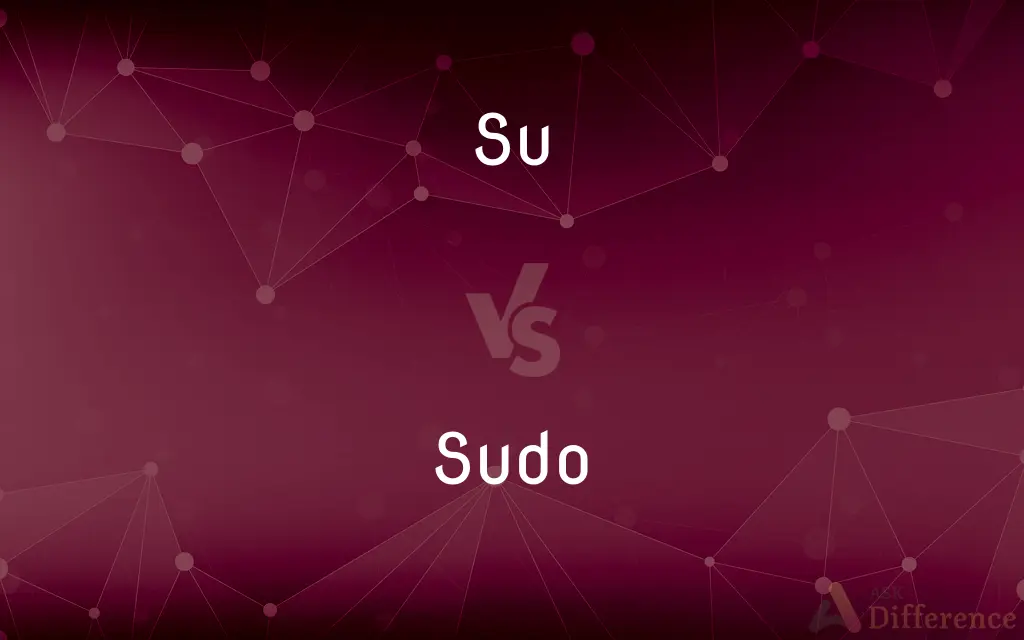Su vs. Sudo — What's the Difference?
Edited by Tayyaba Rehman — By Fiza Rafique — Published on December 8, 2023
"Su" stands for "substitute user" and is used to switch to another user, while "sudo" means "superuser do" and grants permissions to execute a command as another user.

Difference Between Su and Sudo
Table of Contents
ADVERTISEMENT
Key Differences
"Su" and "sudo" are both commands utilized in Unix-like operating systems to handle permissions. "Su" stands for "substitute user," allowing one to log in as another user, typically the superuser. This command changes the user ID during a session. "Sudo," which translates to "superuser do," permits users to execute a specific command as another user, commonly the superuser.
While both "su" and "sudo" can provide elevated privileges, they differ in how they manage user permissions. "Su" changes the user context entirely, often to the root user, while "sudo" allows for the execution of single commands in an elevated context. It's crucial to note that "sudo" can be configured for various commands and users, granting more granular control over permissions.
Safety is a critical distinction between "su" and "sudo." By leveraging "sudo," administrators can give specific users or groups permission to execute certain commands as the superuser, without sharing the root password. On the contrary, "su" demands knowledge of the target user's password, which can be a security risk if it's the root.
Another key difference is in their logging capabilities. Commands executed with "sudo" are usually logged, providing a traceable record. This can be immensely beneficial for understanding system changes or troubleshooting issues. Conversely, "su" does not inherently log the commands executed after switching the user, leading to a lack of accountability.
Comparison Chart
Definition
"Substitute user"
"Superuser do"
ADVERTISEMENT
Purpose
Switch to another user, typically root
Execute specific commands as another user
Security
Requires target user's password
Can run without revealing root password
Granularity of Control
Switches user context entirely
Allows granular permissions for specific commands/users
Logging
Doesn't inherently log commands
Logs executed commands
Compare with Definitions
Su
Often utilized to obtain root privileges.
When modifying system files, su is frequently employed.
Sudo
Can be configured for various commands and users.
He set up sudo permissions to let the team restart the service.
Su
Stands for "substitute user" in Unix-like systems.
Using su, she changed to a different user to access specific files.
Sudo
Often provides a safer alternative to "su."
Instead of switching to root with su, she preferred using sudo for its safety.
Su
Changes the user ID during an active session.
By typing su followed by the username, she switched her user context.
Sudo
A command granting elevated permissions in Unix systems.
She used sudo to install the new software package.
Su
Requires the password of the target user.
He couldn't use su because he didn't know the other user's password.
Sudo
Allows execution of commands as another user.
With sudo, he rebooted the server without logging in as root.
Su
A Unix command for switching to another user.
To become the root user, he used the su command.
Sudo
Logs commands executed with it.
He checked the sudo logs to see who made the system changes.
Common Curiosities
What does "su" stand for?
"Su" stands for "substitute user."
Is "su" safer than "sudo"?
Typically, "sudo" is considered safer as it offers granular permissions and doesn't require sharing the root password.
Which command logs the executed operations?
"Sudo" logs the executed commands, while "su" does not inherently log them.
Do I always need the root password for "sudo"?
No, "sudo" can be configured to run certain commands without a password.
What's the main purpose of "sudo"?
"Sudo" allows users to execute specific commands as another user, often the superuser.
Is "su" used only for switching to the root user?
No, "su" can be used to switch to any user by providing the username.
Why might someone use "su" over "sudo"?
"Su" is used to switch to another user context entirely, often to root, whereas "sudo" is for single commands.
What happens if I misuse "sudo"?
Misusing "sudo" can lead to system instability or security breaches, as it grants elevated privileges.
Do both "su" and "sudo" provide root privileges?
Yes, both can provide root privileges, but they do so in different ways.
How can I configure "sudo" permissions?
Permissions for "sudo" are usually configured in the "/etc/sudoers" file.
Can "sudo" be customized for different users?
Yes, "sudo" can be configured for specific commands and different users.
Which command is more versatile, "su" or "sudo"?
"Sudo" is generally more versatile due to its granular control and configuration options.
Can "su" be used without a password?
Typically, "su" requires the password of the target user.
Why is "sudo" often recommended over "su"?
"Sudo" offers more granular control, logging capabilities, and can be safer than "su."
Does "sudo" work on all Unix-like systems?
While "sudo" is available on many Unix-like systems, its presence and configuration can vary.
Share Your Discovery

Previous Comparison
TCP vs. UDP
Next Comparison
BSc vs. BSc HonsAuthor Spotlight
Written by
Fiza RafiqueFiza Rafique is a skilled content writer at AskDifference.com, where she meticulously refines and enhances written pieces. Drawing from her vast editorial expertise, Fiza ensures clarity, accuracy, and precision in every article. Passionate about language, she continually seeks to elevate the quality of content for readers worldwide.
Edited by
Tayyaba RehmanTayyaba Rehman is a distinguished writer, currently serving as a primary contributor to askdifference.com. As a researcher in semantics and etymology, Tayyaba's passion for the complexity of languages and their distinctions has found a perfect home on the platform. Tayyaba delves into the intricacies of language, distinguishing between commonly confused words and phrases, thereby providing clarity for readers worldwide.














































